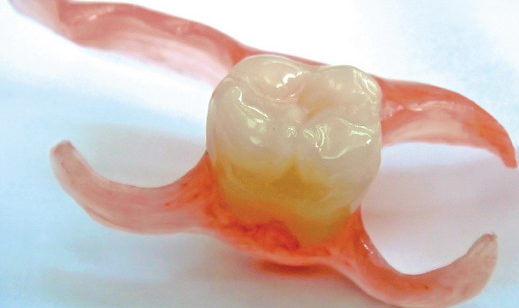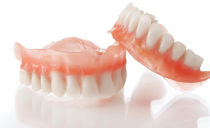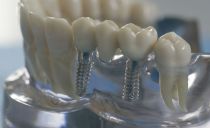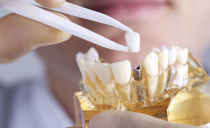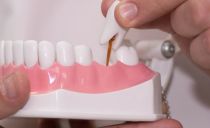Removable full and partial nylon dentures: types, pros and cons, care
Corrosion resistance, flexibility and stability are inherent in nylon, thanks to these qualities the material began to be actively used in dental practice. Nylon dentures are compatible with biological tissues of the human body, practically do not shrink and do not absorb liquid - these are the main reasons why you should pay attention to them.
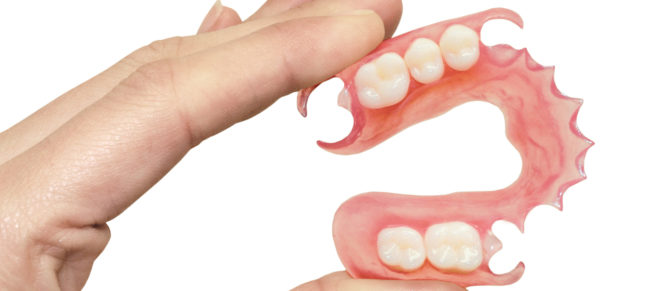
Content
What are nylon prostheses
Depending on the clinical situation, the dentist may suggest:
- complete removable denture (used in the absence of teeth);
- clasp construction, indispensable for single losses in different segments of the oral cavity;
- partial nylon prosthesis of removable type (used in the absence of one or several teeth);
- soft micro prosthesis.
Soft micro products are designed for temporary installation: pending restoration, during treatment, preparation of permanent prostheses. More often they fill one or two teeth.
To keep a soft microprosthesis of nylon (vinyl) in the oral cavity, special arcuate attachments help. They cover adjacent teeth and prevent the structure from moving.
Indications
A biologically neutral nylon denture can be a real salvation for allergic patients, since when using this material there are no edema, irritation, inflammation associated with the chemical composition of the product.
Also, nylon dentures are indispensable:
- at risk of injury (active sports, martial arts);
- with periodontal tissue diseases;
- if you do not want to machine healthy abutments, which is inevitable in the case of ceramic prostheses.
In these situations, the consultant of the dental clinic will offer exactly nylon prosthetics, but it is not suitable for everyone. There are patients who are contraindicated even with partial restoration of the dentition with nylon.
Contraindications
To refuse prosthetics with nylon will have to:
- overhanging the alveolar ridge in the area to be restored;
- suffering from progressive atrophy of the bone tissue of the involved jaw (schematic image in the photo below).
A relative contraindication to the installation of complete prostheses from nylon is the absence of supporting teeth. In this case, the orthopedists suggest placing implants and only then rest the rest of the dentition.
Pros and Cons of Nylon Prostheses
Both the material itself and the structures created from it have advantages. Of these, we can distinguish:
- Natural color, high aesthetic characteristics: light gloss characteristic of the surface of the mucous membrane, imitation of the capillary network.
- Elasticity.
- Strength. Despite the external lightness, nylon dentures easily cope with serious mechanical stresses.
The material does not absorb water, is not prone to staining. He will retain his original appearance for as long as appropriate care will be performed.
A standard nylon denture does not contain metal elements, which eliminates the appearance of an unpleasant aftertaste in the mouth and the occurrence of an allergic reaction.
The main disadvantage of nylon prosthetics is the uneven load on the jaw. Due to its high elasticity, the material bends when chewing and presses on the gums. This is especially worrying for those who have extended gaps in the dentition: 3-4 positions in a row are missing.
Other disadvantages:
- the need to purchase special products for daily care;
- price: the cost of a nylon prosthesis for one tooth starts from 15 thousand rubles;
- increased risk of bone death in places where the load on the jaw is insufficient;
- frequent irritation of the mucosa in places of strong point pressure of the prosthesis.
Both dentists and patients note a long period of fitting the prosthesis, getting used to it. For a removable denture made of nylon to take the correct and comfortable position for the wearer in the oral cavity, it takes more than one month.
On the prohibitions on nylon prosthetics in Europe
At the very beginning of the use of nylon prostheses, the material was much softer, and patients experienced great discomfort. Doctors were forced to constantly customize the design, because of this, some clinics in Europe temporarily excluded nylon prosthetics from the list of services.
Information that sagging nylon prostheses is prohibited in Europe spread very quickly. However, as technology improved, the technology returned, but the rumor remained. Today it is not true: many doctors in Europe consider nylon an indispensable material for allergy sufferers, leading clinics recommend their installation to athletes.
Nylon designs are not prohibited in Russia either. In Moscow and other large cities, the technique of temporary replacement of teeth with partial dentures from nylon is common.
How is nylon prosthetics performed?
From the first visit to the clinic until the final installation of the nylon prosthesis can take from one and a half to two months. The design is complex and involves the manufacture of several stages. Upon examination, the doctor will not only specify how many teeth are missing, but also outline a treatment plan. It includes:
- caries treatment;
- relief of inflammation;
- removal of plaque, stones;
- sanitation of the oral cavity.
In the absence of supporting teeth, the installation of implants will be required, it is included in the cost of prosthetics with nylon. How much prosthetics will cost can be found out only after examination by the dentist, a detailed study of the clinical picture and consultation.
Technical part
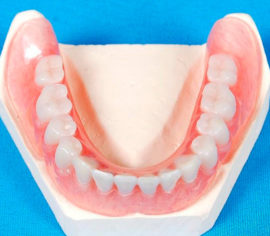 To make a full nylon prosthesis on the lower jaw, as in the photo, the technician will perform several manipulations:
To make a full nylon prosthesis on the lower jaw, as in the photo, the technician will perform several manipulations:
- Will take a cast of the jaw.
- Will make a wax model on it.
- Will try on, smooth out the errors.
- Send the corrected wax design to the lab.
In laboratory conditions, an exact copy of the wax model will be reproduced using a thermal press. Having received it, the doctor partially polishes the surface (in those places where it is in contact with the tongue) and will make another fitting. On this visit, you must discover all the design flaws. If during its fitting discomfort is felt, it is necessary to clarify why and eliminate errors.
A prosthesis is made on the upper jaw in the same way as on the lower jaw, but such products cost less, since less material is spent on their manufacture.
Care Rules
In addition to regular cleaning with a professional paste, a removable nylon prosthesis must be washed with an irrigator and kept in a disinfectant solution. Such manipulations are performed to remove calcareous deposits and dissolve soft plaque.
Prohibited:
- Leave the nylon removable denture outdoors. The material dries quickly and may deform due to lack of moisture.
- Use household cleaning products.
- File, grind, cut and adjust the product to the jaw in some other way.This is the most common reason for the failure of the product.
For professional cleaning and minor repairs, you need to give a removable nylon prosthesis to the dental clinic. This must be done every six months or if flaws are found.
Repairs
During routine cleaning and inspection of a nylon structure, a dental technician may:
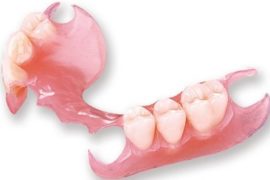 find out why there are redness, swelling on the gum mucosa, adjust the shape of the prosthesis in the rubbing areas;
find out why there are redness, swelling on the gum mucosa, adjust the shape of the prosthesis in the rubbing areas;- free the surface of the product from stones, plaque;
- polish rough areas;
- adjust clasps - locks on which the structure is held (shown in the photo).
If the patient uses such nylon dentures as in the photo, then he has the opportunity to supplement the artificial dentition - if another tooth is lost, the doctor will supplement the product with a new crown.
Brief conclusions
If you weigh the pros and cons of nylon prostheses, the first will be more. Of all types of orthopedic dental products, nylon is the softest. A big plus of the material is biocompatibility, which ensures the absence of allergic reactions in most patients.
Based on the reviews, people are easier to adapt to products for the upper jaw, to designs on the lower jaw get used more difficult. Doctors note the good tolerance of partial dentures and difficulties with fitting full ones. The final decision on the appropriateness of prosthetics with nylon is a joint task of the patient and the dentist. The pros and cons of the material, the cost of the design, the clinical picture of the patient are taken into account.


